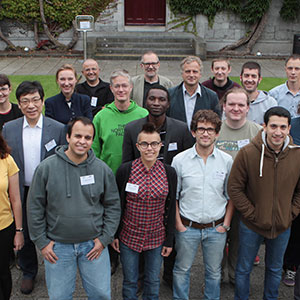-
Cúrsaí

Cúrsaí
Tá roghnú cúrsa léinn ar cheann de na cinntí is tábhachtaí dá ndéanfaidh tú choíche! Féach na cúrsaí atá againn anseo agus an méid a deir mic léinn agus léachtóirí faoi na cúrsaí sin a bhfuil spéis agatsa iontu.
-
Saol na hOllscoile

Saol na hOllscoile
Chuile bhliain roghnaíonn os cionn 4,000 duine Ollscoil na Gaillimhe mar chéad rogha. Faigh amach faoin saol in Ollscoil na Gaillimhe anseo.
-
Eolas Fúinn

Eolas faoi Ollscoil na Gaillimhe
Bí ar an eolas faoin Ollscoil seo agus na fáthanna a bhfuil sí chomh speisialta sin – an stair thar a bheith spéisiúil a bhaineann leis an Ollscoil agus an nuacht is déanaí agus na hócáidí atá ar na bacáin.
-
Coláistí & Scoileanna
- Scoil na Tíreolaíochta, na Seandálaíochta agus Léann Éireannaigh
- Coláiste an Ghnó, an Bheartais Phoiblí & an Dlí
- Coláiste an Leighis, an Altranais & na nEolaíochtaí Sláinte
- Coláiste na hEolaíochta agus na hInnealtóireachta
- Scoil na dTeangacha, na Litríochtaí agus na gCultúr
- Roinn na Gaeilge
- An tAcadamh
- Stair
- Idirnáisiúnta

Coláistí & Scoileanna
Tá aitheantas idirnáisiúnta bainte amach ag Ollscoil na Gaillimhe mar ollscoil atá á treorú ag an taighde agus rún daingean aici teagasc den chéad scoth a chur ar fáil i réimsí éagsúla saineolais.
-
Taighde

Nithe Fónta á gCruthú as Smaointe Úra
Tugann ár dtaighdeoirí aghaidh ar chuid de na dúshláin is práinní san 21ú Céad.
-
Gnó & Tionscal

Tacaíocht do Thaighde Úrnua in Ollscoil na Gaillimhe
Déanaimid deiseanna tráchtála a chuardach agus a chothú don phobal taighde in Ollscoil na Gaillimhe, mar aon le comhpháirtíocht tionsclaíochta a chothú.
-
Alumni, Cairde & Lucht Tacaíochta

Alumni, Cairde & Lucht Tacaíochta
Tá os cionn 90,000 céimí de chuid Ollscoil na Gaillimhe ann ar fud an domhain. Déan nasc linn agus beidh teacht agat ar an gcomhphobal sin ar líne.
-
Rannpháirtíocht Pobail

Rannpháirtíocht sa Phobal
In Ollscoil na Gaillimhe, creidimid go n-éireoidh níos fearr leat más féidir leat an méid a fhoghlaimíonn tú a chur i bhfeidhm i do shaol féin. Is mar gheall air sin go bhfuil béim mhór ar shocrúcháin oibre nó ar thionscadail phobail i gcuid mhór dár gcúrsaí.
Nuacht
University of Galway announce inaugural recipient of the Maev Creaven Scholarship
A new scholarship supporting women in engineering and digital health has been awarded for the first time at University of Galway. Jescintha George Poruthur, a postgraduate student on the MSc in Medical Electronics and Digital Health, is the inaugural recipient of the Maev Creaven Scholarship. Dorothy Creaven established the scholarship in memory of her sister, Maev Creaven, a University of Galway graduate and healthcare innovator. An Electronic Engineering graduate, Maev Creaven was widely regarded as a pioneer in her field in Ireland, combining her scientific training with a commitment to wellbeing, education and practical innovation in healthcare. Dorothy Creaven said: “Maev believed in pushing the boundaries of innovation in healthcare and encouraging people to think beyond conventional paths. This scholarship was established in her memory to support women who are applying engineering and technology in ways that can genuinely improve lives. My family and I are proud to see her name associated with a programme that looks forward and supports the next generation of healthcare innovators.” Professor Edward Jones, Programme Director of the MSc in Medical Electronics and Digital Health at University of Galway, said: “We’re very proud of Jescintha as the inaugural recipient of the Maev Creaven Scholarship. She is a wonderful example of the energy and commitment to innovation in medical device technology that we aim to foster in this programme, reflecting the values – innovation, compassion, and impact – that defined Maev’s work. We thank Dorothy for creating a lasting tribute to her sister’s contribution to healthcare.” Professor Laoise McNamara, Head of the School of Engineering at University of Galway, said: “We are sincerely grateful to Dorothy Creaven for establishing this scholarship for women pursuing the MSc in Medical Electronics and Digital Health. This scholarship was created in honour of our former student Maev Creaven and reflects her strengths, passions, and commitment to these fields. This scholarship will support talented students with the potential to thrive, creating a legacy that will inspire and empower our graduates to make a meaningful difference in engineering and digital health.” Ends
Minister Calleary launches digital edition of first Irish-language newspaper An Gaodhal
Seolann an tAire Calleary leagan digiteach den chéad nuachtán Gaeilge An Gaodhal
University of Galway launches new prototype hub in partnership with Medtronic
Friday, 16 December 2022
All eligible University of Galway full time and part time hourly payscales have been updated in line with the provisions of Building Momentum - A New Public Service Agreement 2021-22. Specifically the following increases have been implemented: - With effect from 02nd February 2022, payscales received a 3% increase - With effect from 01st October 2022- payscales received a further 1% increase or €500, whichever is greater We are still awaiting sanction for the implementation of FEMPI restoration wef 1st July 2022 (save for a limited number of pay scales). Therefore there are no changes to those grades\pensions for now. See paragraph 1.3 in the above link for more details. Further advice will be issued for these grades in due course.
Monday, 24 April 2023
We have been asked to bring to your attention the fact that Secondment Expression of Interest Notices has been issued for the Public Service Transformation Division of the Department of Public Expenditure, NDP Delivery and Reform. Expressions of interest are invited from across all sectors of the Public Service, including higher education, and across a number of grades. Notices are available directly at the following link, and DPENDR and DFHERIS would very much appreciate your support in circulating to your staff. The closing date for applications is 2nd May, and we understand the notices issued on Friday 14th April.









